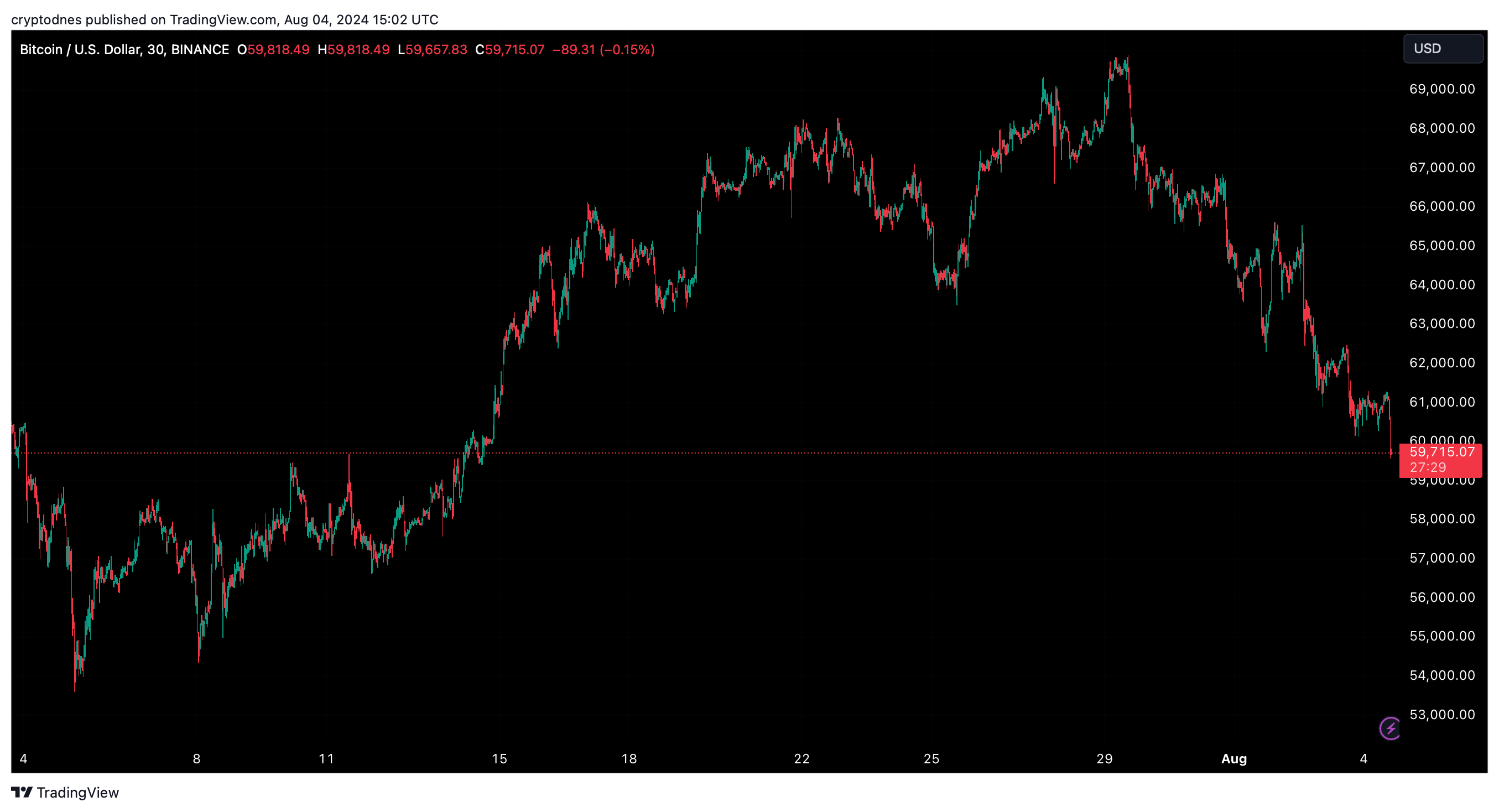Bitcoin Dropped Below $60,000 Again – What Could be the Reason?
04.08.2024 18:39 1 min. read Alexander Stefanov
Bitcoin (BTC) saw a significant drop over the weekend, with the token price trying to get back above $60,000.
According to “RLinda,” a crypto trading expert at TradingView, this decline is part of a broader consolidation phase lasting five months.
Bitcoin‘ s losses over the weekend can be attributed to a combination of economic data, market sentiment, significant ETF outflows and the failure to overcome the critical $70,000 resistance level
Macroeconomic indicators played a crucial role in the price decline. The U.S. nonfarm payrolls report released on August 2 showed an increase in unemployment from 4% to 4.3% and rising inflation, which created negative market sentiment. The weak jobs report heightened fears of a recession, leading to a sell-off in Bitcoin.
Additionally, Farside data reveals significant outflows from Bitcoin ETFs, with $237.4 million in outflows on August 2 and $80.4 million for the week.
Additionally, the bankruptcy restructuring of Genesis Trading and the distribution of $4 billion in assets may have contributed to the market’s decline, worsening market sentiment due to emerging concerns of a potential sell-off.
At the time of writing, Bitcoin is trading at $59,700, reflecting a decline of 4% in the last 24 hours and over 11% in the last 7 days
 .
.
-
1
Here is What to Expect From Bitcoin by End of 2025
17.06.2025 19:00 2 min. read -
2
Michael Saylor Urges Apple to Buy Bitcoin
11.06.2025 9:00 1 min. read -
3
Bitcoin Nears Key Support Levels Amid Growing Market Uncertainty
10.06.2025 18:00 1 min. read -
4
Strategy’s Michael Saylor Says Bitcoin’s Volatility Era Is Over
13.06.2025 8:00 1 min. read -
5
Bitcoin Price Prediction: Can the Genius Act Push Bitcoin to $200K?
20.06.2025 22:52 3 min. read
Why Bitcoin Is Stuck Despite Wall Street Demand
Charles Edwards, founder and CEO of Capriole Investments, has offered a fresh perspective on Bitcoin’s stalled price movement near the $100,000 mark, despite growing institutional enthusiasm.
Metaplanet Now Holds 13,350 BTC Worth $1.4 Billion
Metaplanet has expanded its Bitcoin treasury with a new acquisition of 1,005 BTC valued at approximately $108.1 million, further cementing its status as one of the largest corporate holders of the digital asset.
Bitcoin Averages 37% Rebound After Crises, Binance Research Finds
Despite common fears that global crises spell disaster for crypto markets, new data from Binance Research suggests the opposite may be true — at least for Bitcoin.
Bitcoin Mining Faces Profit Crunch, But No Panic Selling
A new report by crypto analytics firm Alphractal reveals that Bitcoin miners are facing some of the lowest profitability levels in over a decade — yet have shown little sign of capitulation.
-
1
Here is What to Expect From Bitcoin by End of 2025
17.06.2025 19:00 2 min. read -
2
Michael Saylor Urges Apple to Buy Bitcoin
11.06.2025 9:00 1 min. read -
3
Bitcoin Nears Key Support Levels Amid Growing Market Uncertainty
10.06.2025 18:00 1 min. read -
4
Strategy’s Michael Saylor Says Bitcoin’s Volatility Era Is Over
13.06.2025 8:00 1 min. read -
5
Bitcoin Price Prediction: Can the Genius Act Push Bitcoin to $200K?
20.06.2025 22:52 3 min. read


